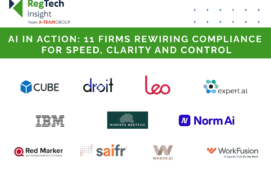Nasdaq’s Global Survey Highlights AI, Cloud, and Data Quality as Key Drivers in Compliance Evolution
The financial services sector is navigating an increasingly complex regulatory and operational landscape, as highlighted in Nasdaq’s ninth Annual Global Compliance Survey. The survey, conducted among 94 compliance professionals from the sell-side, buy-side, and financial market infrastructure sectors, underscores a notable shift in compliance strategies driven by advancements in technology and data integration.
Technological Transformation in Compliance
With heightened regulatory scrutiny and the persistent challenge of financial crime, firms are leveraging technologies like artificial intelligence (AI) and cloud computing to stay ahead. A significant 35% of survey respondents expect AI to drive the most substantial changes in compliance processes over the next year—a stark increase from 9% last year and 0% the year before.
This pivot reflects a move away from basic workflow automation to more sophisticated, data-driven approaches. Firms are investing in tools to integrate disparate data sources, enhance cross-product surveillance, and improve data quality. These advancements aim to address ongoing challenges like false positives in automated systems, which, according to nearly 90% of respondents, remain a major issue. “False positives drain resources and delay critical decision-making,” noted Ed Probst, Senior Vice President of Regulatory Technology at Nasdaq. “The promise of AI lies in its ability to refine alert systems and prioritize genuine threats.”
Data-Centric Strategies and Workforce Evolution
Organizations are also redirecting investments to strengthen data management and analytical capabilities. Over the next two years, 12% of firms plan to hire data scientists, and 13% intend to bolster their teams with additional support staff. This shift highlights the growing importance of advanced data analytics in maintaining robust compliance systems.
However, the survey reveals a need for a more cohesive approach to integrating AI and analytics strategies. “The rapid deployment of algorithms must align with broader data management frameworks to deliver meaningful insights,” commented an industry expert.
The trend is mirrored across financial organizations, where investments in data infrastructure and predictive analytics are becoming integral to both risk management and operational efficiency.
The Expanding Role of Compliance Teams
Surveillance and compliance teams continue to play a strategic role in corporate decision-making. More than three-quarters of respondents agreed that these functions maintain a “seat at the table,” reflecting their critical role in fostering ethical business practices and safeguarding reputational integrity.
Despite a slowing growth rate in regulatory spending, over 40% of firms reported increased compliance budgets this year. The allocation of funds increasingly favors advanced analytics over traditional monitoring tools, indicating a strategic pivot towards future-proof compliance infrastructures.
Looking Ahead
Nasdaq’s findings underscore the importance of technology-driven solutions in tackling the evolving challenges of compliance. As firms navigate this dynamic environment, investments in data quality, AI, and skilled talent will be pivotal in building agile and resilient compliance frameworks.
“Compliance is no longer just about adhering to rules,” added Probst. “It’s about leveraging technology to anticipate and adapt to risks in a rapidly changing world.”
This shift signals a broader transformation within the financial services industry, where the integration of advanced technology with strategic governance is becoming a cornerstone of effective compliance.
Subscribe to our newsletter





